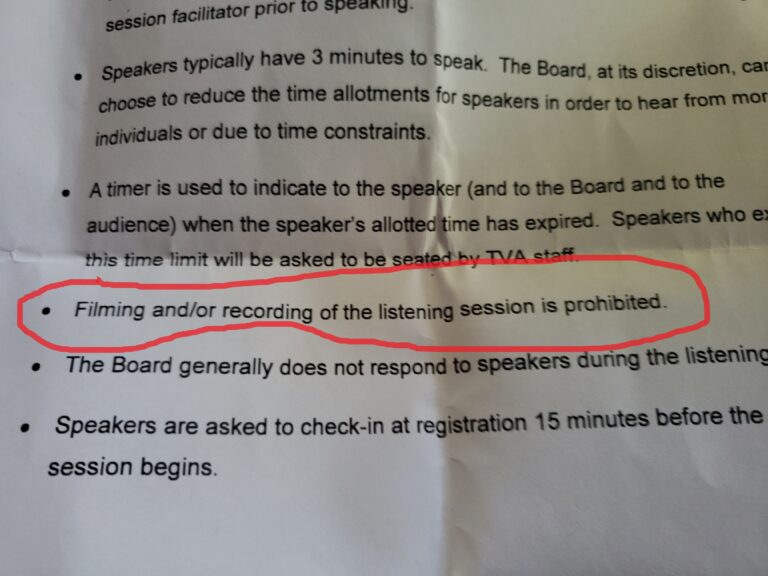“We pushed back on this, telling them that we already had a Facebook streaming event set up and promoted,” said Scott Banbury, Conservation Programs Coordinator for the Tennessee chapter of the Sierra Club.
In the past, TVA allowed more public participation in their listening sessions, along with live-streaming the events. But several years ago, TVA stopped streaming the event, required speakers to register within a limited time frame and gave shorter notice as to when the listening sessions were held. And since changing their public listening sessions from being held the day of the board meeting to the day before, attendees have had increasing difficulties in publicly participating in TVA’s dealings, which are held in different locations each year.
This year, a recent session was held at the University of Tennessee at Martin, located nearly three hours away from Nashville and twice that from Knoxville, making the ability to record crucial for those wanting to stay up to date on TVA business.
After pushing back on the recording prohibition, which was listed on set of guidelines for speakers to follow, “TVA staff conferred for a few minutes and decided it was alright to stream the event if we did so from the back of the room,” said Banbury.
“I pointed out that the Sierra Club staff (who) would be doing the streaming was in the front row next to the speakers podiums, and after conferring with each other again, TVA staff agreed to allow us to stream from the front row,” he added.
Because the session was not available online through TVA, Sierra Club members have argued that a public listening session should be made publicly available and the current format limited the ability of the public to participate in these sessions and hear concerns from other Tennessee residents.
“It’s really the one way that a lot of people can hear from each other about what their requests are of the TVA board,” said Sierra Club member Amy Kelly, adding that TVA provides coverage to millions in six states.
This year, the Sierra Club and other speakers at the session shared their concerns about the rising cost of natural gas prices and TVA’s plans to replace a coal plant with a natural-gas plant.
“It’s important people hear what the requests are from TVA’s board, like the 188 comments we submitted requesting TVA switch from coal to renewable energy instead of gas,” said Kelly.
In 2018, Sierra Club members sent a letter to TVA’s board of directors about the session’s limitations and asked that the TVA advertise the event, send alerts in advance, increase time limits for speakers and overall make the sessions more convenient for the public to attend.
“As the largest grassroot environmental organization in Tennessee, we have serious concerns about the structure of the pilot,” said Sierra Club spokesperson Jonathan Levenshus in a letter to the TVA board.
“The late posting of the session’s details did not give people enough time to plan for attendance — even if they were able to attend a 2:30 p.m. meeting on a weekday — or address topics the board discussed during its meeting the following day. The new format also removed same-day speaker registration and the session was not streamed live so that those unable to travel or take time off from work could still be informed,” the letter read.
TVA responded that they would take their comments into consideration, but Sierra Club members have yet to see significant changes.
In 2020, TVA closed meetings to the public because of COVID-19. And because of this, the Sierra Club also held their own TVA-centered public listening sessions through the Tennessee Valley Energy Democracy Network, created to increase public participation with TVA’s coverage.
“Now we’re back to in-person meetings but it’s this same format that doesn’t really work very well,” said Sierra Club member Bonnie Swinford.
The most recent board meeting was the second session held in person.
After the public listening session, TVA conducts their quarterly board meetings the following day and summarizes comments and concerns made the day before for board members to address.
The public listening sessions are just one of many ways that the TVA offers public participation and changes were made to allow for comments to be considered before the meeting. Pertinent information is published on their websites and social media outlets.
“The listening sessions are intended to be direct communication with the TVA board. That channel is available to anyone in writing or in person on the day before each board meeting,” said Brooks.









